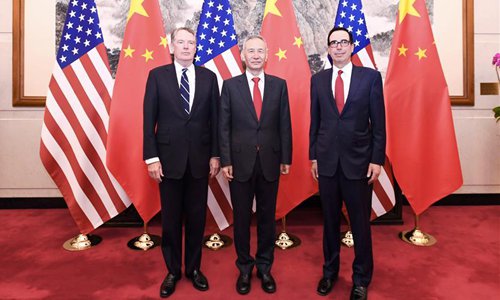HOME >> OPINION,SPECIAL-COVERAGE
Equality key for China-US talks to resume
Source:Global Times Published: 2019/6/25 22:03:41

File Photo: Xinhua
Chinese Vice Premier Liu He held a phone conversation with US Trade Representative Robert Lighthizer and US Treasury Secretary Steven Mnuchin on Monday. The two sides exchanged views on trade issues following the instructions from the phone talk between the two state leaders. Both sides said they would continue to communicate without disclosing more details to the media.
We have noticed that compared to the period preceding the China-US summit on the sidelines of the G20 Buenos Aires summit in December last year, public opinion in the two countries is much less optimistic now. It looks the two sides have cooled down after the excitement generated by the phone conversation between the two state leaders last week and are assessing more cautiously the differences that are obstacles to the resumption of trade talks.
However, differences can always exist between the two countries and can be further expanded because of their different interests. But this is not the major stumbling block to the new round of trade talks. Cooperation could generate interest, for which it is necessary to make compromise. Once there is willingness to compromise, it is not difficult to bridge the differences.
China and the US have reportedly resolved about 90 percent of the disagreements, so there must be room to resolve the remaining issues of dispute.
The key is the two sides' attitude toward this remaining 10 percent. The breakdown in the previous negotiations came because the US used tariffs as a lever to make China fully accept its conditions. Washington was even trying to infringe upon China's national sovereignty, which is absolutely unacceptable.
To resume the talks, it is important to have sincerity and uphold the principles of equality. China will by no means make unprincipled concessions in exchange for a trade truce. That would mean the US can willfully coerce China by exerting maximum pressure, which is much worse than any short-term pain caused by additional tariffs and cutting off supply to Chinese high-tech enterprises.
It is evident that neither China nor the US desires a protracted trade war. China understands that the US wants bilateral trade to be more balanced, and US intellectual property to be more respected. The two sides should resolve these problems practically, but the US believes that maximum pressure is the best bargaining chip, and will help the US impose its will on China. But national security concerns mean that China will maintain its vigilance against this tactic of maximum pressure.
It is not hard for China and the US to make progress on specific trade issues, unless the US turns trade into politics. We do not know whether the US is willing to promote an extreme China strategy at the cost of economic losses brought by the trade war. But we know that we will defend national sovereignty at any cost.
We hope to see positive momentum during the G20 summit in Japan. But Chinese society will not be too disappointed if no consensus is reached, because the twists and turns in the past year have reduced people's expectation of a decisive deal and made us doubt the US' sincerity in implementing the agreement.
China's principles and bottom line are clear, but the US' are not. Washington adjusts its negotiating tactics according to the US economy, and next year's presidential election will have an influence. We hope the US will be pragmatic toward the negotiations. If Washington still wants to try exerting maximum pressure, Beijing will have to wait patiently for it to return to realism.
RELATED ARTICLES:
Posted in: EDITORIAL,COMMENTS